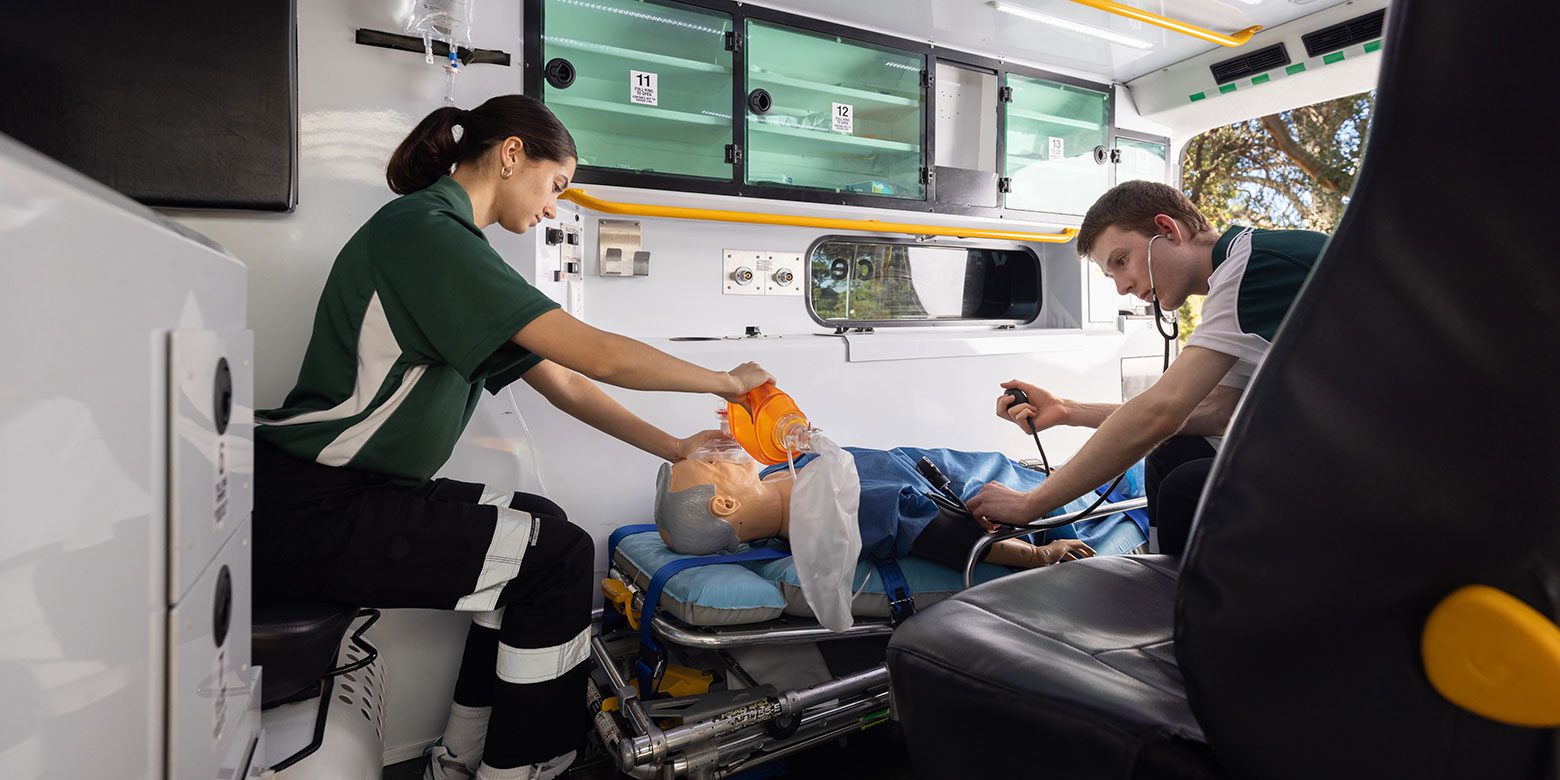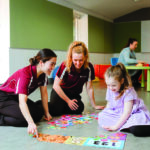When you think of paramedics, it’s easy to imagine flashing lights, fast-paced emergencies and dramatic rescues. But as paramedic and Curtin researcher Derek Collings-Hughes explains, the role is far broader – and often more personal.
“The role of a paramedic is really about providing care for people in your community,” Derek says. “And that doesn’t always look like the big, fancy lights and sirens. Sometimes, it’s sitting with nanna in her kitchen, sharing a cup of tea while offering advice and reassurance.”
If you’re drawn to helping people and building genuine connections, paramedicine could be the career for you. Whether you’re finishing high school or exploring a career change, this guide will walk you through what it takes to become a paramedic – from the realities of the job to study pathways and future opportunities.
Skip to a particular section from the list below:
- What career paths are available as a paramedic?
- What’s it really like to work as a paramedic?
- How much do paramedics earn in Australia?
- How do you become a paramedic in Australia?
- What skills and qualities do you need to become a paramedic?
What career paths are available as a paramedic?
Paramedics work almost anywhere. You could be providing critical care on a rescue flight, delivering a baby in the back of an ambulance or helping someone after a fall in their garden.
“There’s been a rapid progression in the types of paramedic roles over the past 15 to 20 years,” Derek says. “Many people think paramedics only work in emergency ambulances, but across Australia, about a third don’t. And within WA, it’s probably closer to 50%.”
Specialist opportunities are growing, particularly in mental health and primary care.
“As a paramedic today, you might run a clinic on an oil rig or mine site, provide mental health support, lead training or cover emergencies on industrial sites. In New Zealand, many of my colleagues now work in urgent care clinics, and I think that could become a reality in Australia, too.”
Here are some examples of the diverse careers available in paramedicine:
- ambulance paramedic 🚑
- flight paramedic 🚁
- rural or remote paramedic 🌏
- disaster response paramedic 🌪️
- paramedic educator 🎓
- critical care transport paramedic 🩺
- primary health care paramedic 🧑⚕️
- event/entertainment paramedic 🎥
- maritime paramedic ⚓
- humanitarian paramedic 🌍
- firefighter paramedic 🧯
- research paramedic 🧪
- mental health response paramedic 🧠
- tactical paramedic 🚓
For Derek, the appeal is in the variety:
“Early on, I trained the New Zealand Fire Service and Coast Guard in advanced First Aid. During my Honours year, I started sessional teaching. Now I teach, work on my PhD and practise as a paramedic – I really enjoy the mix.”
What’s it really like to work as a paramedic?
Rescuing farmers pinned under quad bikes, performing CPR on a boat and working in tricky terrain are all part of Derek’s experience. But he says the most rewarding moments aren’t the dramatic ones.
“I’ve done some huge ‘once-in-a-career’ jobs – many times. I’ve had big dramas, looked after really unwell patients … and while those jobs can be satisfying because you use a lot of your clinical skills, or do something a bit fancy like pull out of a helicopter, they aren’t the ones that stick with me. The jobs that leave me the most satisfied are where I get to spend time with someone, have a conversation, and feel like I’ve made a difference.”
And when it comes to delivering babies? Derek admits most paramedics are nervous.
“I’ve done a couple of births and, like most paramedics, I’m terrified! We’re always happy for the midwives to show up. But we’re well trained, and every year we attend birthing education as part of professional development.”
Despite these dramatic moments, Derek says much of a paramedic’s day is shaped by routine and preparation.
“As an ambulance paramedic, shifts start in a similar way, by ensuring your vehicle is stocked and ready,” he explains. “You’ll run tests on the defibrillator, make sure the oxygen is full, then log on and see what calls are waiting.”
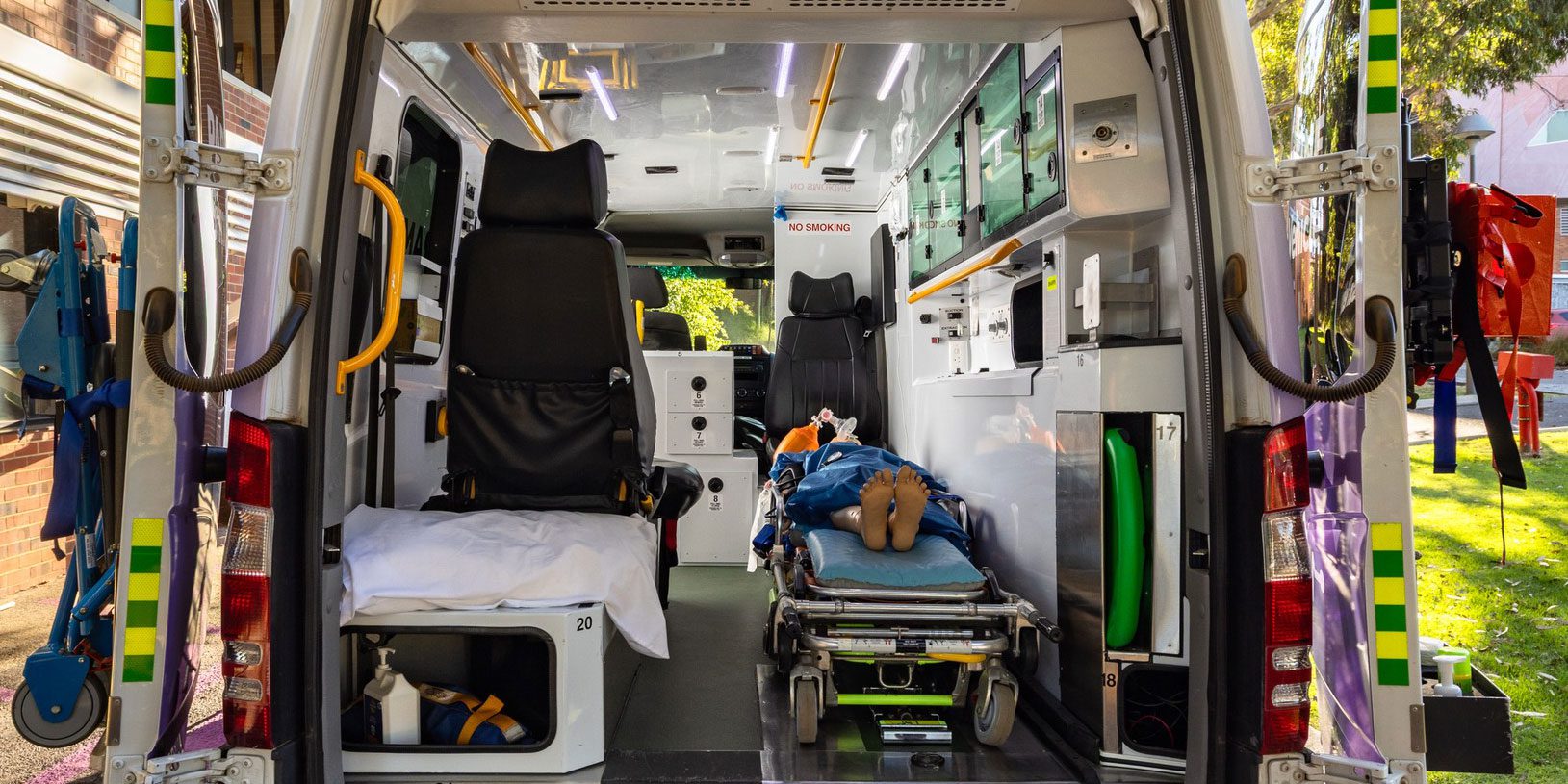
One of the unique aspects of the role, Derek says, is caring for one patient at a time.
“If we’re waiting for a hospital bed, we stay with our patient – whether that’s for half an hour or several hours – until a care plan is in place. Once that’s done, we clear from the job and become available for the next call.”
Shifts can include nights, weekends and public holidays.
“I primarily work day shifts and early shifts,” Derek says. “But if you’re on a late or night shift, you might take over from an ambulance crew at the hospital. Sometimes, they’ll be waiting on a bed for their patient, known as ramping, so we step in. We call that ’rolling ramping’.”
Is there demand for paramedics in Australia?
Yes — and it’s growing. In 2025, there are 28,100 paramedics employed across the country, with annual employment growth of around 7%, according to Jobs and Skills Australia.
With an ageing population and expanding communities, both state ambulance services and private providers are seeking more trained professionals, especially in rural and remote regions.
Derek has noticed the difference:
“When I first started, you could log on and not know if you were getting a job straight away or in three hours. Now it’s predictably busy — most of the time there’s a job waiting immediately.”
If you’re considering paramedicine, it’s an exciting time to join a profession with strong career prospects, meaningful work and opportunities to make a genuine difference in people’s lives.
How much do paramedics earn in Australia?
Paramedic salaries vary by state, experience and role. As a graduate, you can expect to earn a starting base salary around $65,000 to $75,000 per year, plus additional pay for overtime, shiftwork and regional postings.
“Penalties associated with shiftwork can make up nearly a third of your income,” Derek says. “As a graduate paramedic, your starting salary could be close to 100k.”
According to Seek, the average annual salary for paramedics in Perth is between $110,000 and $125,000, plus penalties.
How do you become a paramedic in Australia?
To become a qualified registered paramedic in Australia, you’ll usually need to complete an accredited Bachelor of Paramedicine or a similar degree. For the most current information on qualifications and registration requirements, visit the Paramedicine Board of Australia website.
How long does it take to become a paramedic?
A Bachelor of Paramedicine typically takes three years of full-time study. After graduating, you’ll apply for registration with the Paramedicine Board of Australia through the Australian Health Practitioner Regulation Agency (AHPRA). Once registered, you can apply for roles with ambulance services, private providers or in specialist fields.
Working as a paramedic in Western Australia
If you’re planning to work as a paramedic in Western Australia, you’ll need to complete a degree, such as Curtin’s Bachelor of Science (Paramedicine)*. This specialised course equips you with the skills, practical experience and clinical knowledge to work as a paramedic both in Australia and overseas.
“A big focus of Curtin’s paramedicine course is face-to-face learning. We offer weekly laboratories so our students can practise their clinical skills regularly. Each semester is followed by a block placement in a different setting – aged care, primary care, mental health and ambulance. We really aim for students to experience working where paramedics work, and in my experience, that’s everywhere.”
One of the highlights of the course is the ‘simbulance’, Curtin’s simulated ambulance.
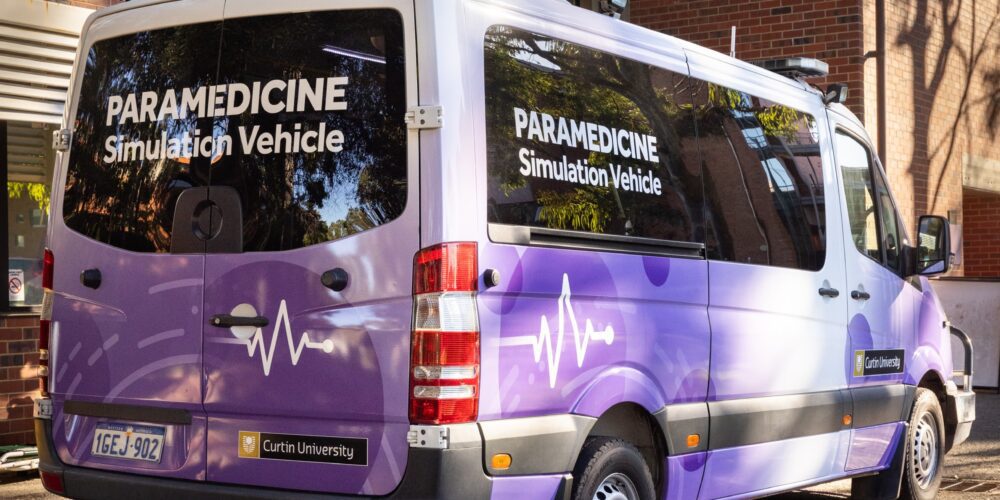
“The simbulance is really a mobile classroom,” Derek says. “We use it to teach students how to move patients from a scene to a vehicle, across different surfaces, handling and moving patients when they’re on a chair or a stretcher, and navigating stairs and busy roads. We also take it to the Juniper simulation suite, which is set up like someone’s home, so students can practice in realistic environments.”
*Please note: this new program of study is undergoing an accreditation assessment with the Paramedicine Accreditation Committee in 2025.
What skills and qualities do you need to be a paramedic?
According to Derek, the number one skill is people skills.
“A big part of our job is being able to communicate with a wide range of people in stressful situations, and that can be quite challenging. You need to be able to talk to people of different ages, cultures and backgrounds.”
That’s why communication is woven throughout Curtin’s Bachelor of Paramedicine.
“We thread these skills throughout the program,” Derek says. “We help students to build the ability to connect, build rapport and work with diverse communities.”
Of course, practical and clinical expertise to respond to emergencies is essential. Curtin students are trained to manage everything, from advanced airway care to resuscitation ensuring they’re prepared for a wide range of scenarios.
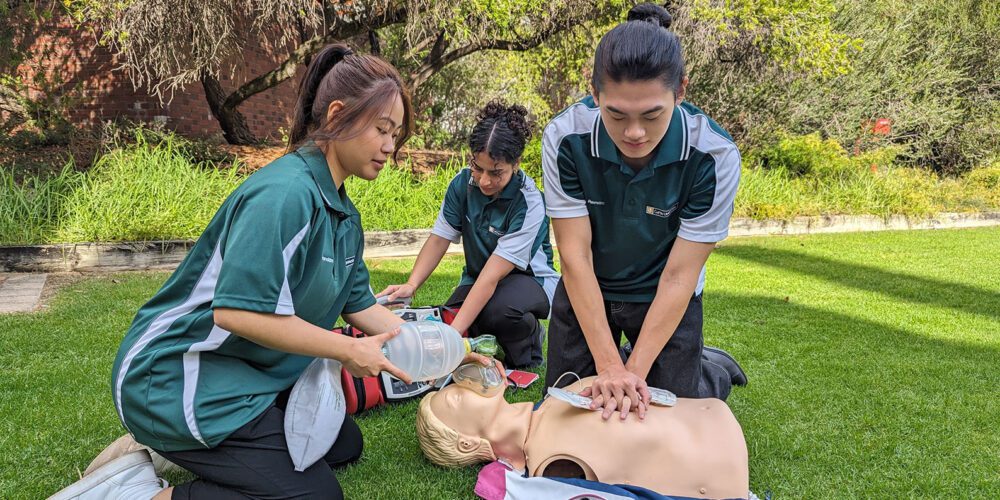
Staying calm under pressure
Paramedics often face emotionally charged or confronting situations, so the ability to project calm and manage stress is vital. Derek says this comes from preparation and experience.
“In healthcare, we talk about reducing cognitive load — creating systems and preparing in advance so that you only have a limited number of decisions to make when things happen. That, combined with practice in lots of different settings, helps you become confident. For example, putting in an IV should feel second nature, so you can focus on the patient and the next steps. And above all, it’s important to prioritise.”
Equally important is projecting calm to others.
“Years ago, I was taught never to rush onto a scene. Walk calmly and purposefully. If you rush, you’ll scare people. Act like you’re in control.”
Is paramedicine the right path for you?
If you’re motivated to make a difference, thrive in a dynamic environment and want a career that truly matters, paramedicine can be deeply rewarding.
Derek explains that one way to explore your fit for the role is to step outside your comfort zone.
“I often recommend students work or volunteer in places like soup kitchens,” he says. “It can help you work out if paramedicine is the right career for you.”
But just as important is asking yourself how you respond in a crisis.
“In my job we often have a lot of bystanders, whether that’s family or passersby, and you’d be amazed at how most people, when things hit the fan, really do rise to the occasion,” Derek says. “Often, before we arrive, you’ll find people providing first aid, offering reassurance or even re-directing traffic. But would they want to get up and do that again the next day? That’s the difference between a member of the public and someone who wants to be a first responder.”
He also suggests connecting with paramedics in the field.
“It’s really important to talk to a paramedic about what the job is actually like. It’s not what you see on TV – all big emergencies and lights and sirens. That pace isn’t sustainable. You’d burn out really quickly. Chatting to people, researching what paramedic work involves and exploring the different career paths is essential.”
To sustain a long and rewarding career, it’s also important to look after your wellbeing outside of work.
“I think maintaining strong relationships outside of work and generally looking after myself are the key to coping with day-to-day stresses,” Derek says. “I like cycling and mountain biking — and I notice when I haven’t had the time to do those things. Sleep and eating well are also important.”
Beyond the skills and variety, Derek says paramedicine brings profound perspective.
“I’ve developed a real appreciation for the fragility of life and just how special and beautiful it is,” he says. “It reminds you not to squander your time, but to stop and appreciate the moment. You also get a deep insight into the diversity of experiences and circumstances within our communities. There aren’t many jobs where you see such an intimate view of people’s lives across so many backgrounds. It changes your perspective on life every day.”
